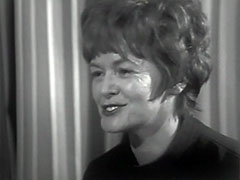Secondary Navigation Menu
Home > Events > Women's Revolution > The Advent of the Pill
| Image | Description |
|---|---|
 |
[Journalist]: Well, in the course of a study on sexuality today at the Université de Montréal, Mrs. Fernande Saint-Martin, editor of the magazine Châtelaine. |
| Mrs. Saint-Martin provided an account in which she had to answer the following question: Is contraception, from the onset, a means of liberating women, and Mrs. Saint-Martin explained her thoughts, on this question, Mrs. Saint-Martin | |
| [Fernande Saint-Martin]: The emancipation of women began at the beginning of the century, long before the pill. | |
| It is the result, I believe, of the fact that the industrialized society reduced well, in a nutshell, it essentially reduced the number of children per family and women then had more time on their hands, years of potential activities, possibilities for integration indeed, industrial society beckoned women to work outside the home. | |
| There ensued a long and slow definition of questions raised by women, but what has happened to date here, is that despite the fact that female sexuality is intimately related to fertility, made it extremely difficult to find a solution to the real problems faced by women. | |
| For centuries, the maternal function has, in a certain way, obliged women to cut themselves off from society and remain at home to raise the children. | |
| With contraception, a woman obviously faces freedom of choice now. | |
| She has freedom of choice in a society less and less enamoured with reproduction. | |
| [J]: And this, with the best means of contraception | |
| [FS-M]:With, mmmm, yes, before she faced the risk of chance and a high incidence of accidents which finally, and in spite of all rationalizations, found herself in the same situation of having children. | |
| Now it is possible not to have children. | |
| It is possible not to have children in a society that no longer seeks to have children in a certain way, she will have to justify herself if she decides to have children because she wants to that she finds that the creation of life is a value of superior worth. | |
| From a personal standpoint, I think that it is there that repercussion will be greatest because it will allow, I believe, an emancipation, if you will, or a maturation unknown to women to date because sexuality, in my opinion, has always been traumatized as early as adolescence, by the revelation that a woman's sexual life is linked to maternity. | |
| Which, I believe, prevented feminine sexuality from developing, encouraging instead a passive attitude encouraged fear and anxiety, in fact all of what contributed to the very particular character of women in centuries past. |


